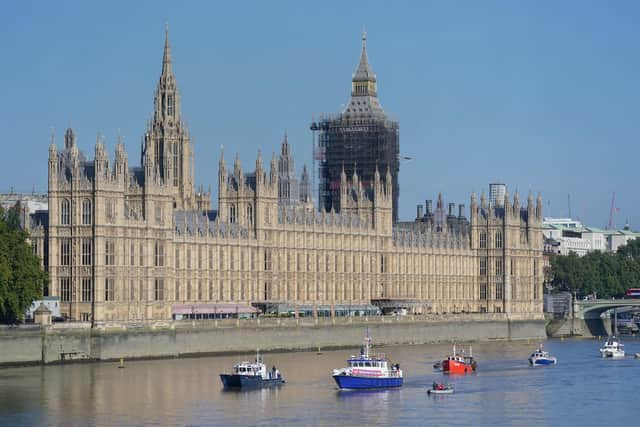I've wondered what's the point of carrying on, says Yorkshire consultant who faces 'devastating' loan charge
The Loan Charge and Taxpayer Fairness All Party Parliamentary Group (APPG) described the financial situation for many people facing the loan charge as an ongoing nightmare.
It has also been revealed that HMRC has referred eight cases to the Independent Office for Police Conduct (IOPC) where a taxpayer has taken their life and used a “disguised remuneration” scheme.
Advertisement
Hide AdAdvertisement
Hide AdIn a written response to a Parliamentary question, Lucy Frazer, Financial Secretary to the Treasury, said: “Following referral, HMRC has conducted independent investigations and the completed investigations have concluded that there was no evidence of misconduct by an HMRC officer. Any loss of life is a tragedy, and my thoughts are with the families of those affected.”


The loan charge was designed to tackle tax avoidance schemes where individuals receive income in the form of loans that are not repaid to avoid income tax.
The Government announced a review in 2019 after the policy left thousands of people on modest incomes with large and unexpected tax bills.
In December 2019, the Government announced a package of changes to the loan charge in response to Sir Amyas Morse’s review, but the APPG still believes the policy is flawed.
Advertisement
Hide AdAdvertisement
Hide AdSpeaking during a debate on the Finance Bill, Labour MP Ruth Cadbury, said: “The reality is that if HMRC enforces the loan charge on the thousands of people who now face it, there will be many more bankruptcies, more mental anguish and potentially more suicides, as well as more people losing their homes and more unable to continue to work.”
Ms Cadbury said the Finance Bill “does nothing to support those already impacted by the loan charge and still being forced to sign illegal disguised remuneration schemes if they want to do the work in which they are skilled”.
At least 144 Parliamentarians have signed an open letter to the Prime Minister and the Chancellor calling for a resolution to the loan charge.
An IT software consultant, who lives near Sheffield, and faces the loan charge, said: “I’ve lost all my confidence, don’t sleep well and I’m constantly worried and often feel depressed to the point where I’ve wondered what’s the point of carrying on.”
Advertisement
Hide AdAdvertisement
Hide AdHe said he was told by an umbrella company that the scheme was legal and approved by a tax lawyer every year to ensure HMRC compliance.
He added: “The umbrella companies are getting away with this, and simply shutting up shop and leaving their poor clients with all of this burden.”
In her written response, Ms Frazer said: “The Government takes concerns about the wellbeing of all taxpayers seriously and recognises that the Loan Charge can add significant pressures for some taxpayers.
“Following Lord Morse’s Independent Loan Charge Review, the Government has taken further steps to mitigate the impact of the Loan Charge and to ensure that the right support is in place for those who need it.
Advertisement
Hide AdAdvertisement
Hide Ad“HMRC operates a settlement helpline and a debt helpline for taxpayers who have used disguised remuneration avoidance schemes.
“All call handlers are trained to identify taxpayers who might need additional support. For taxpayers who need specialised help, HMRC advisors suggest they contact organisations like Samaritans or Mind. The Government is working with HMRC to consider what additional specialised support could be provided to taxpayers who need extra help.”
Earlier this year, the Chancellor Rishi Sunak, told The Yorkshire Post that the policy, which was designed to tackle tax avoidance schemes, had “already been through” a lot of scrutiny and been amended and adjusted.
A HMRC spokesman told The Yorkshire Post recently: “The Loan Charge was introduced to ensure those who used disguised remuneration tax avoidance schemes paid their fair share of income tax and national insurance contributions. Individuals are responsible for their own tax affairs, and it is only right that we continue to tackle these type of avoidance schemes as they deprive our public services of vital funding.
Advertisement
Hide AdAdvertisement
Hide Ad"Sir Amyas Morse led an independent review into the policy in 2019 and concluded that it was right that the loan charge remain in force. The Government recognised concerns around its impact, which is why it accepted all but one of the recommendations made, leading to significant changes in legislation.
"We encourage anyone who is worried about paying their Loan Charge to contact us so we can help.
"We are committed to working with taxpayers to enter manageable payment plans to spread their tax liability and ensure that they are affordable.
"HMRC will take action against schemes marketed as enabling contractors to pay less tax than they should. Contractors who are worried that they have been offered such a scheme can contact HMRC.
Advertisement
Hide AdAdvertisement
Hide Ad"Around 20 promoters have moved out of promoting altogether in the last six years due to HMRC activity.
"In November 2020 HMRC launched an awareness campaign “Tax Avoidance – Don’t get caught out” targeted at contractors in the IT, medical and oil and gas industries where promoters are particularly active.
"This campaign advises taxpayers how to spot avoidance schemes, including those promoted by umbrella companies, explains the risks involved and where people can get more information to enable them to make informed choices if they want to leave an avoidance scheme.
"Draft guidance on GOV.UK shows how the government is tackling tax avoidance promoters."
Comment Guidelines
National World encourages reader discussion on our stories. User feedback, insights and back-and-forth exchanges add a rich layer of context to reporting. Please review our Community Guidelines before commenting.
